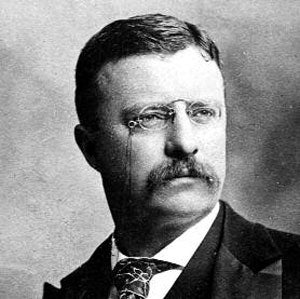Theodore Roosevelt
26th president - 1901-1909

Stepping into the shoes of President McKinley shortly before his 43rd birthday, Theodore Roosevelt became the youngest President in US history.
His energy and confidence brought new excitement and power to the presidency, as he led Congress and the American public toward progressive reforms and a strong foreign policy. His support for – and conspicuous gallantry in – the Spanish-American War had already made him a national hero. He used this prestige to assert the president's right to take any action necessary for the public good unless expressly forbidden by law or the Constitution. "I did not usurp power," he later wrote, "but I did greatly broaden the use of executive power."
Born in New York City in 1858 into a wealthy family, Roosevelt struggled with ill-health as a child and attributed his subsequent robustness to a regime of strenuous exercise. A former governor of New York, he based his presidency on the ideal that the government should be the arbiter of the nation's conflicting economic forces, guaranteeing justice both to capitalists and to workers with his "Square Deal" and dispensing favours to no one. He soon proved himself an effective "trust buster", forcing the dissolution of some 40 monopolies and combinations. He also introduced the regulation of the food and drug industries and achieved notable advances in conservation, adding to the national forests in the West and reserving lands for public use.
His foreign policy was equally assertive. In 1904 he added the Roosevelt Corollary to the Monroe Doctrine, reserving for the US the sole right to intervene in the affairs of rogue states in Latin America and preventing the establishment of foreign bases in the Caribbean. His mediation in the Russo-Japanese War won him the Nobel Peace Prize. He also ensured the construction of the Panama Canal and wrote numerous books.
Easily re-elected in 1904, he stood by his pledge not to stand for re-election in 1908, but stood again in 1912, as a Progressive. (He had failed to win the Republican nomination.) This split the Republican vote, handing Woodrow Wilson an easy victory.
He contracted malaria during a seven-month expedition through Brazil in 1913-1914 and never entirely regained his health. He died in 1919.
In his words
"Speak softly and carry a big stick; you will go far."
"The first requisite of a good citizen in this republic of ours is that he shall be able and willing to pull his weight."
"A man who has never gone to school may steal from a freight car; but if he has a university education, he may steal the whole railroad."
In others' words
"He is the most dangerous man of the age." Woodrow Wilson
"Men say he is not safe. He is not safe for the men who wish to prosecute selfish schemes to the public detriment." Elihu Root
Minutiae
He wore pince-nez to correct severe short sight. This was partly due to a detached retina he suffered while sparring in the White House with the boxing champion John L Sullivan.
He had a photographic memory, and could recite lengthy passages from books he had read decades earlier.
His mother and his first wife both died on the same day in 1884.
He was nicknamed Teddy after a cartoon depicted him sparing the life of a bear cub while hunting, allegedly on the basis of a real-life incident.
The cavalry regiment he led during the Spanish-American war consisted largely of football players, polo players and cowboys without military experience. They were known as the "Rough Riders".
He was the first US president to travel by car, by plane or by submarine, and the first president to leave the country (visiting Panama) while in office.
Wounded by the bullet of a would-be assassin in 1912, he refused to go to hospital until he had given the hour-long speech that he was due to give.
He would eat up to 12 eggs for breakfast.
His youngest son, Quentin, died fighting on the Western Front (as a pilot) in 1918.
Join our commenting forum
Join thought-provoking conversations, follow other Independent readers and see their replies
Comments
Bookmark popover
Removed from bookmarks